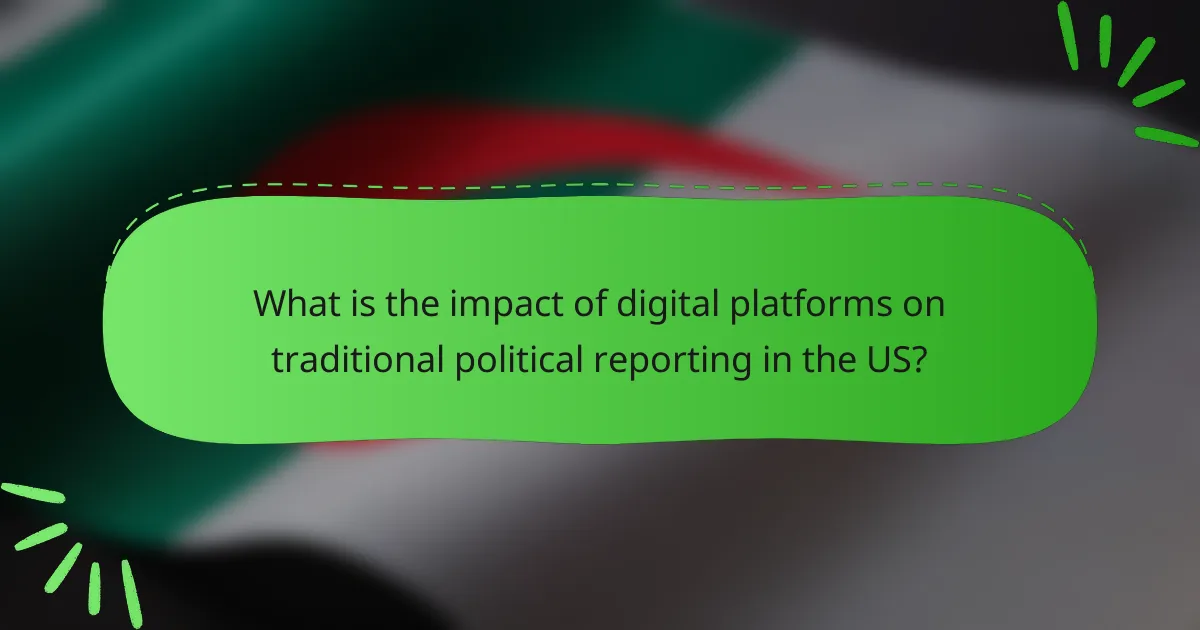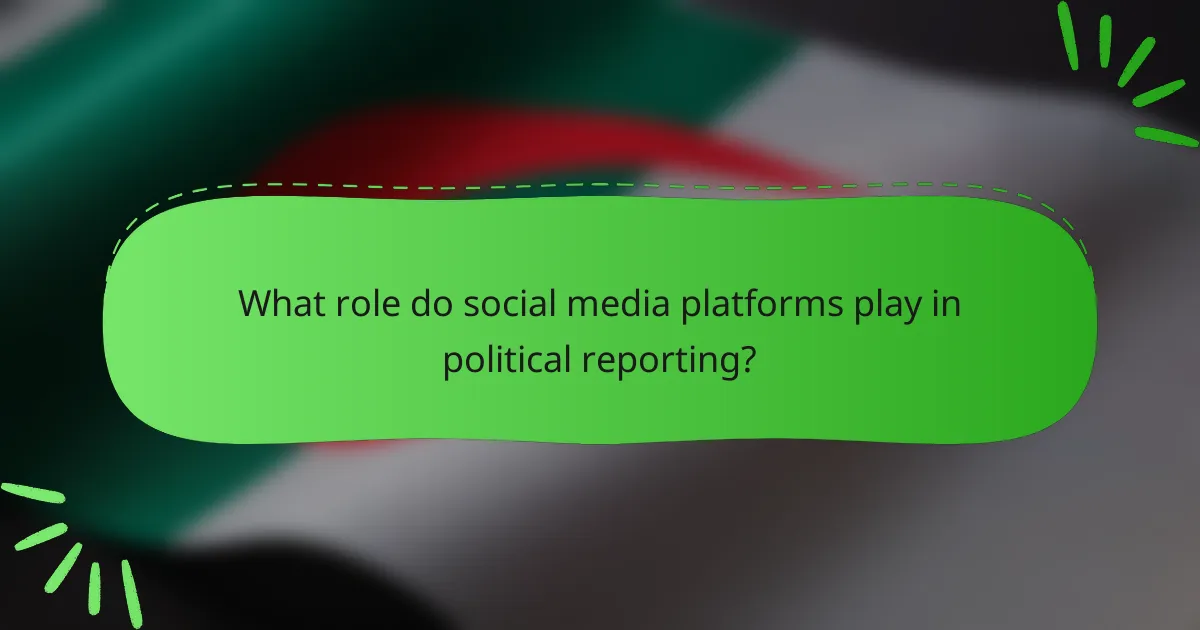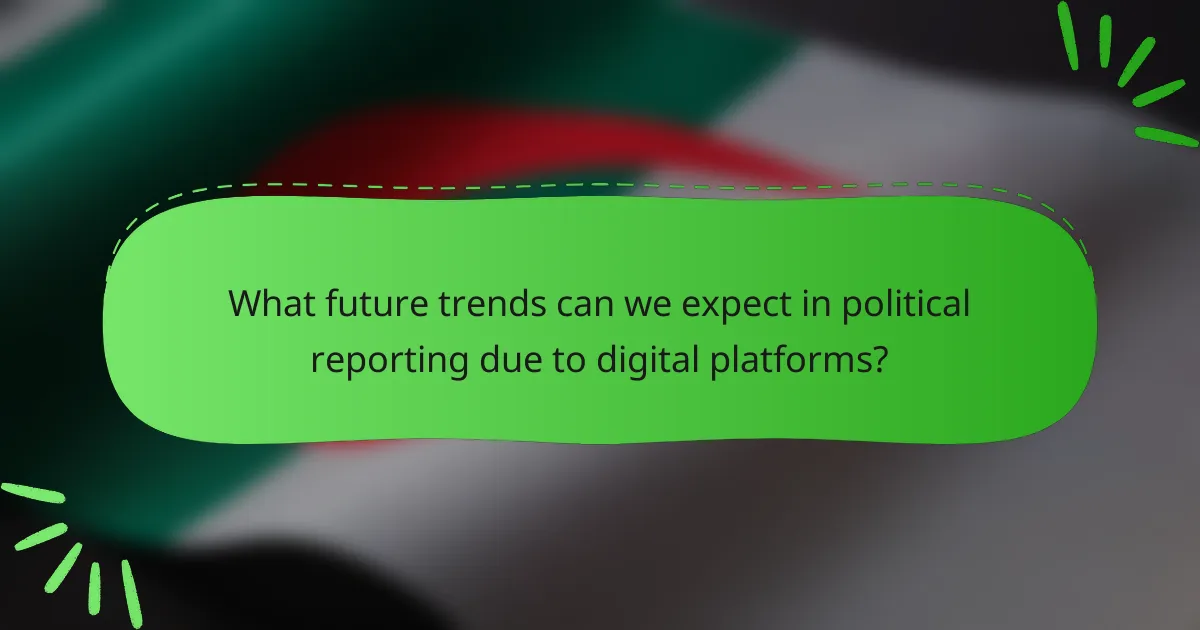Digital platforms are transforming traditional political reporting in the United States by accelerating news dissemination and enabling real-time updates through social media. Journalists now engage directly with audiences, allowing citizens to participate in reporting and commentary, which introduces diverse perspectives but also raises concerns about misinformation. Social media platforms, such as Twitter and Facebook, have become crucial channels for news consumption, with a significant portion of the population relying on them for political information. The future of political reporting is expected to feature increased real-time reporting, personalized news feeds, and the rise of citizen journalism, all of which will influence public opinion and political discourse.

What is the impact of digital platforms on traditional political reporting in the US?
Digital platforms significantly alter traditional political reporting in the US. They enhance the speed of news dissemination. Journalists can now share updates in real-time via social media. This immediacy changes how news is consumed and reported. Traditional outlets face pressure to adapt quickly. Digital platforms also democratize information access. Citizens can engage in reporting and commentary. This shift can lead to diverse perspectives. However, it also raises concerns about misinformation. Studies show that misinformation spreads rapidly on these platforms. Traditional media must combat this challenge to maintain credibility.
How have digital platforms transformed the landscape of political reporting?
Digital platforms have significantly transformed the landscape of political reporting. They have increased the speed at which news is disseminated. For instance, social media allows real-time updates and immediate audience engagement. Traditional media outlets now compete with digital-native organizations for audience attention. The accessibility of information has democratized political reporting. Anyone with internet access can share news or opinions, altering the authority of established journalists. Furthermore, algorithms shape the news that users see, influencing public perception and discourse. According to a Pew Research Center study, 62% of Americans get news from social media. This shift has led to a rise in citizen journalism, where individuals report on events directly from the ground. Overall, digital platforms have reshaped how political news is produced, consumed, and understood.
What are the key characteristics of traditional political reporting?
Traditional political reporting is characterized by objectivity, accuracy, and a focus on facts. It emphasizes unbiased reporting of political events and issues. Journalists strive to present multiple viewpoints. This approach fosters informed public discourse. Traditional reporting often relies on official sources and documents. It also includes in-depth analysis of political contexts. Additionally, traditional political reporting adheres to ethical standards and journalistic integrity. These characteristics have historically shaped the public’s understanding of politics.
How do digital platforms differ from traditional media in political reporting?
Digital platforms differ from traditional media in political reporting by offering immediacy and interactivity. Digital platforms allow for real-time updates, enabling faster dissemination of information. Traditional media often relies on scheduled broadcasts or print cycles, which can delay reporting.
User engagement is another key difference. Digital platforms facilitate direct interaction between journalists and audiences through comments and social media. Traditional media typically maintains a one-way communication model, limiting audience feedback.
Furthermore, digital platforms provide diverse content formats, including videos, podcasts, and infographics. Traditional media primarily focuses on text and broadcast formats.
Analytics tools available on digital platforms enable tailored content based on audience preferences. Traditional media lacks such granular audience insights.
Lastly, digital platforms can amplify marginalized voices and alternative viewpoints, while traditional media often adheres to established narratives. This shift influences the overall landscape of political reporting.
Why is the shift towards digital platforms significant for political reporting?
The shift towards digital platforms is significant for political reporting because it enhances accessibility and immediacy of information. Digital platforms allow for real-time updates, enabling journalists to report on breaking news as it happens. This immediacy can increase public engagement and awareness of political events. According to the Pew Research Center, 55% of U.S. adults get news from social media, highlighting the importance of these platforms in shaping public discourse. Additionally, digital platforms provide diverse voices and perspectives that traditional media may overlook. This democratization of information fosters a more informed electorate. The shift also allows for multimedia storytelling, engaging audiences through videos, infographics, and interactive content. Overall, the transition to digital platforms transforms how political reporting is consumed and understood.
What are the potential benefits of digital platforms for political journalism?
Digital platforms enhance political journalism by increasing accessibility and engagement. They allow for real-time reporting and updates on political events. This immediacy helps journalists provide timely information to the public. Additionally, digital platforms facilitate audience interaction through comments and social media shares. This interaction fosters a community around political discourse. Furthermore, data analytics on these platforms help journalists understand audience preferences. This insight enables tailored content that resonates with readers. According to a Pew Research Center study, 62% of Americans get news from social media. This demonstrates the significant role digital platforms play in shaping political journalism today.
What challenges do traditional reporters face in adapting to digital platforms?
Traditional reporters face several challenges in adapting to digital platforms. One major challenge is the rapid pace of news cycles. Digital platforms demand immediate reporting, which can pressure traditional reporters who are accustomed to longer timelines. Another challenge is the need for multimedia skills. Reporters must now create videos, podcasts, and social media content, which requires different expertise.
Additionally, traditional reporters often struggle with audience engagement. Digital platforms prioritize interactive content, and reporters must learn to connect with audiences in new ways. There is also the challenge of information overload. The vast amount of content online can make it difficult for reporters to stand out and for audiences to discern credible sources.
Moreover, traditional business models are under threat. Many newspapers face declining revenues as advertising shifts to digital platforms. This financial pressure can limit resources for training and technology. Lastly, adapting to digital platforms requires a shift in mindset. Reporters must embrace new tools and approaches, which can be a significant adjustment from traditional reporting methods.

What role do social media platforms play in political reporting?
Social media platforms serve as critical channels for political reporting. They enable real-time dissemination of information during political events. Journalists utilize these platforms to share updates and engage with audiences. Social media also facilitates direct communication between politicians and the public. This bypasses traditional media gatekeepers, allowing for unfiltered messages. A study by the Pew Research Center found that 53% of U.S. adults get news from social media. This statistic underscores the significant role of social media in shaping political narratives. Additionally, platforms like Twitter and Facebook influence public opinion and mobilize political movements.
How do social media platforms influence public perception of political events?
Social media platforms significantly influence public perception of political events by shaping the information landscape. They provide a space for real-time news dissemination and user-generated content. This immediacy can amplify narratives, often prioritizing emotional resonance over factual accuracy. Algorithms on these platforms favor content that engages users, which can lead to echo chambers. Research indicates that individuals are more likely to share emotionally charged information. This sharing can skew perceptions, as users may encounter biased or misleading content. A study by the Pew Research Center found that 64% of Americans believe social media has a mostly negative effect on the way things are going in the country today. Thus, social media platforms play a crucial role in framing political discourse and influencing public opinion.
What are the mechanisms through which social media shapes political narratives?
Social media shapes political narratives through several mechanisms including information dissemination, audience engagement, and algorithmic amplification. Information dissemination occurs when users share news articles, opinions, and personal experiences, allowing rapid spread of political content. Audience engagement is facilitated through comments, likes, and shares, which create discussions and influence perceptions. Algorithmic amplification prioritizes content based on user interactions, often promoting sensational or polarizing posts. Research shows that platforms like Facebook and Twitter can significantly sway public opinion during elections. For instance, a study by the Pew Research Center found that 64% of Americans use social media to access news, highlighting its role in shaping political discourse.
How does user-generated content impact traditional political reporting?
User-generated content significantly alters traditional political reporting by democratizing information dissemination. This shift allows individuals to share perspectives and news directly, bypassing traditional media gatekeepers. As a result, traditional political reporting faces increased competition from citizen journalists and social media influencers.
Research by the Pew Research Center indicates that 62% of Americans get news from social media platforms. This statistic highlights the growing reliance on user-generated content for political information. Furthermore, user-generated content can lead to rapid information spread, sometimes outpacing traditional news outlets.
This phenomenon can create challenges for traditional reporters, who must verify facts amidst a flood of unfiltered information. Moreover, user-generated content often reflects diverse viewpoints, which can enrich political discourse but may also contribute to misinformation.
In summary, user-generated content reshapes traditional political reporting by fostering competition, altering information flow, and influencing public perception.
What are the implications of social media on journalistic standards?
Social media significantly alters journalistic standards. It promotes rapid news dissemination but often sacrifices accuracy. Journalists face pressure to publish quickly, leading to less fact-checking. This can result in the spread of misinformation. A Pew Research study found that 62% of Americans get news from social media. This reliance can diminish the credibility of traditional journalism. Furthermore, social media encourages sensationalism to capture attention. This shift impacts the quality and integrity of news reporting.
How do digital platforms affect the accuracy and reliability of political news?
Digital platforms significantly impact the accuracy and reliability of political news. They facilitate rapid dissemination of information. This speed can lead to the spread of misinformation before verification occurs. A study by the Pew Research Center found that 64% of Americans believe fabricated news stories cause confusion about current events. Algorithms on social media prioritize engagement over accuracy. This can amplify sensational or misleading content. Furthermore, user-generated content lacks editorial oversight. This absence can result in the proliferation of unverified claims. Consequently, the reliability of political news is often compromised on these platforms.
What are the ethical considerations for journalists using digital platforms?
Journalists using digital platforms must consider accuracy, transparency, and accountability. Accuracy involves verifying information before publication. Misinformation can spread rapidly on digital platforms, leading to public distrust. Transparency requires journalists to disclose sources and methods. This fosters trust with the audience. Accountability means taking responsibility for content shared. Ethical lapses can damage reputations and undermine journalistic integrity. Additionally, journalists should respect privacy and avoid sensationalism. Ethical guidelines from organizations like the Society of Professional Journalists emphasize these principles. Following these considerations helps maintain credibility in digital reporting.

What future trends can we expect in political reporting due to digital platforms?
Future trends in political reporting due to digital platforms include increased real-time reporting, personalized news feeds, and the rise of citizen journalism. Digital platforms allow for instant dissemination of information. This immediacy enhances engagement and responsiveness in political reporting. Personalized news feeds use algorithms to tailor content to individual preferences. This can lead to echo chambers, affecting public discourse. Additionally, citizen journalism empowers individuals to report news, often filling gaps left by traditional media. The Pew Research Center noted that 64% of Americans now get news from social media. This shift indicates a growing reliance on digital platforms for political information.
How will technology continue to evolve in the realm of political journalism?
Technology will continue to evolve in political journalism through advancements in artificial intelligence and data analytics. These technologies enable journalists to analyze vast amounts of data quickly. AI tools can assist in fact-checking and identifying trends in political discourse. Additionally, automation will streamline the production of news content. This evolution will enhance the speed and accuracy of reporting. For example, AI-generated summaries can provide quick insights into complex political issues. Furthermore, augmented reality and virtual reality will create immersive storytelling experiences. These innovations will engage audiences in new ways. Overall, the integration of technology will reshape how political news is gathered, reported, and consumed.
What innovations are emerging in digital political reporting?
Emerging innovations in digital political reporting include the use of artificial intelligence for data analysis. AI tools can process large datasets quickly, identifying trends and insights that human reporters might miss. Another innovation is the integration of interactive storytelling formats. These formats allow users to engage with political content through polls, quizzes, and multimedia presentations. Live-streaming platforms are also gaining traction, enabling real-time coverage of political events. Additionally, social media analytics are being utilized to gauge public sentiment and influence reporting strategies. Fact-checking tools are increasingly being incorporated to enhance accuracy in reporting. These innovations collectively enhance the depth and engagement of political reporting in the digital age.
How might audience engagement change in the future of political reporting?
Audience engagement in political reporting may increasingly rely on digital platforms and interactive content. As technology evolves, audiences expect more personalized and immediate access to information. Social media platforms will likely facilitate direct communication between journalists and the public. This could foster a more participatory approach to news consumption. Data-driven insights will help tailor content to audience preferences. Additionally, multimedia storytelling may enhance engagement through visual and interactive elements. Research indicates that 64% of Americans believe social media is a significant source for political news. Therefore, the shift towards digital engagement is evident and will continue to shape political reporting.
What best practices can traditional reporters adopt to thrive in a digital environment?
Traditional reporters can thrive in a digital environment by embracing multimedia storytelling. This includes using video, audio, and interactive graphics to engage audiences. They should also prioritize social media to distribute content and connect with readers. Building a strong online presence through personal branding is essential. Reporters must adapt to audience feedback and analytics to refine their approach. Collaborating with digital platforms can enhance visibility and reach. Continuous learning about digital tools and trends is crucial for staying relevant. According to a Pew Research Center study, 86% of journalists use social media for news distribution.
How can journalists effectively use social media to enhance their reporting?
Journalists can effectively use social media to enhance their reporting by leveraging real-time updates and audience engagement. They can share breaking news instantly, reaching a wider audience quickly. Social media platforms facilitate direct interaction with followers. This allows journalists to gather feedback and insights from the community. Additionally, journalists can use social media for sourcing information and verifying facts. Platforms like Twitter enable them to connect with experts and eyewitnesses. According to a Pew Research study, 62% of Americans get news from social media. This statistic underscores the importance of social media as a news distribution channel. By utilizing these tools, journalists can improve the accuracy and relevance of their reporting.
What strategies can be implemented to maintain journalistic integrity in digital platforms?
Implementing strategies to maintain journalistic integrity in digital platforms involves establishing clear editorial guidelines. These guidelines should prioritize accuracy, fairness, and transparency in reporting. Journalists must verify information through multiple reliable sources before publication. Additionally, fostering a culture of accountability within news organizations is essential. This includes encouraging corrections and clarifications when errors occur.
Training staff on ethical standards and digital literacy can enhance their ability to navigate misinformation. Utilizing fact-checking tools and collaborating with independent fact-checkers can further support integrity. Engaging audiences through transparent communication about journalistic processes can build trust. Finally, adhering to established journalistic codes of ethics, such as those from the Society of Professional Journalists, reinforces commitment to integrity.
The main entity of this article is the impact of digital platforms on traditional political reporting in the US. The article examines how digital platforms have transformed the speed, accessibility, and interactivity of political news, challenging traditional reporting standards. Key topics include the rise of citizen journalism, the influence of social media on public perception, and the ethical considerations for journalists in a digital landscape. It also addresses the challenges traditional reporters face in adapting to these changes and the future trends shaping political reporting. Overall, the article provides a comprehensive analysis of the evolving relationship between digital media and political journalism.